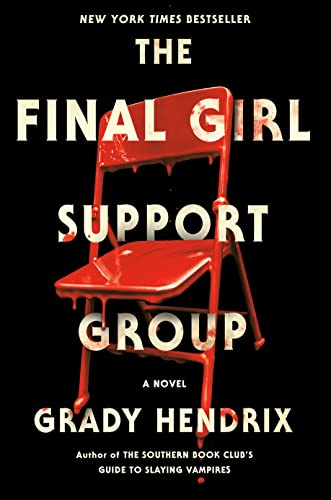![]() The Final Girl Support Group by Grady Hendrix
The Final Girl Support Group by Grady Hendrix
 The title of Grady Hendrix’s 2021 novel might make you think it’s a horror story in the slasher-movie style, and there are plenty of nods to horror here. Actually, the book is a thriller, and as a thriller it works pretty well. Hendrix intersperses the thriller with some dark, zany humor, trauma-fueled angst, and toxic sisterhood rants, but the story’s at its best when our main character, Lynette, is on the run from, well, everybody.
The title of Grady Hendrix’s 2021 novel might make you think it’s a horror story in the slasher-movie style, and there are plenty of nods to horror here. Actually, the book is a thriller, and as a thriller it works pretty well. Hendrix intersperses the thriller with some dark, zany humor, trauma-fueled angst, and toxic sisterhood rants, but the story’s at its best when our main character, Lynette, is on the run from, well, everybody.
The Final Girl Support Group opens with Lynette preparing to attend that very group. Lynette has turned her LA slum-neighborhood apartment into a bunker. She does self-defense drills before setting out, hyper-vigilant, to attend the group she participates in every week with five other women, all in their late thirties, who survived not one but two bloody, savage, and terrifying attacks when they were in their teens. They’ve been meeting for decades with the same therapist, Dr. Carol, and they’ve been a support for each other through good times and bad, but the group is fraying now, and something’s gone horribly wrong. When one member doesn’t show up, the others seem slow to figure out what the reader already knows — someone, maybe several someones — is coming after the Final Girls. And now there’s a new Final Girl, Stephanie, the sole survivor of an attack on the camp run by the Adrienne, the group member who didn’t make the meeting.
Hendrix uses ephemera and found documents between each chapter; articles about the slasher film phenomenon; speeches from various characters, and evidentiary material from several of the attacks — letters from or to the killers, interviews with the survivors. I didn’t find this material as useful as it could have been, but I suppose it could be seen as a palate cleanser. One nit-pick I have to say bothered me all the way through — Adrienne, (not a spoiler, she’s dead), runs a program for female victims of trauma. One of the chapter-break bits is a speech of hers, in which she talks about slasher films as films that glorify killing women. I’m not a big consumer of slasher movies, but in the few I’ve seen, men get killed too, often in equal numbers.
As I said, I’m not a slasher movie expert, and my vocabulary about them is shaped entirely by Scream and The Cabin in the Woods, which is technically not a slasher movie but a commentary on slasher movies. Still, I live in the 21st century, so I had no trouble identifying Freddy, Jason, and the killer from the Halloween franchise. I think the other movie referenced is Black Christmas, (?) but I’d be happy to have anyone correct me on that. Hendrix gives the films different names — Texas Chainsaw Massacre is Panhandle Hacksaw, for example.
As I said, when Lynette is running, trying and failing to either protect the others, including Stephanie, or get their help, this story fires on all cylinders. Where it failed for me was in the supposed ages of the Final Girls. These women didn’t read like people in their late thirties to me, with the possible exception of Marilyn. I was willing to accept that Lynette, severely traumatized, is stuck, but I couldn’t buy that with the others, who have gone on with their lives. The way Julia tricks her way into Lynette’s fortress-apartment, literally risking her life, didn’t fit with what we’d been told of that character. Heather is believable as a junkie, but not a thirty-something. When Lynette meets the creepy-strange characters Chrissie, later in the book, I was completely convinced by her. I was not convinced by these survivors.
Lynette distrusts everyone, except when she chooses to trust exactly the wrong people. The book needs this to succeed, and while it jarred me, I could understand it, because I’ve seen this behavior in young adults who had traumatic childhoods. Once again, it’s the developmental issue here. Lynette’s been in therapy for twenty years — some of it should have taken.
I also had a hard time understanding everything that happened when Lynette is arrested by the LAPD on the word of the law enforcement officer who investigated her slasher situation. LAPD treats her badly — that’s plausible. The way they treated her badly wasn’t plausible to me, so much so that I kept waiting to find out that it was a hallucination. The “reveal” of that whole sequence seemed downright unbelievable. All that said, it sets Lynette running, this time in a stolen car, and when Lynette is running the book is good.
So, this sounds like a lot not to like, but I stayed up until midnight to finish it, so the suspense held me. If you like thrillers and are good at suspending disbelief this might be a treat for you. As a bonus, Hendrix knows his slasher flicks.



If the state of the arts puzzles you, and you wonder why so many novels are "retellings" and formulaic rework,…
I picked my copy up last week and I can't wait to finish my current book and get started! I…
Gentlemen, I concur! (Forgive me for jumping into your convo)
The cover is amazing. I love how the graphic novel (and the review!) hewed close to the theme of "good…
I've thought about picking that one up. The artwork looks perfect.